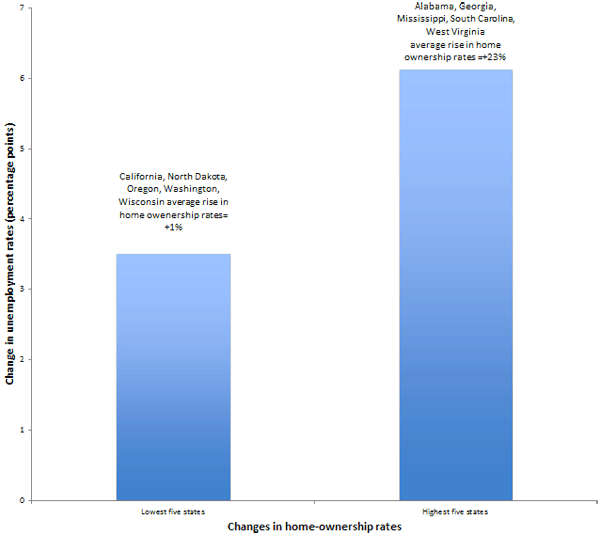Unemployment is once again the bane of the US and Europe. This column highlights an intriguing association between home ownership and high unemployment using US state-level data. Given the heavy subsidisation of and rise in home ownership, this association merits more attention from economists.
Unemployment matters. It is a major source of unhappiness, mental ill-health, and lost income. Yet after a century of economic research the determinants of unemployment are still imperfectly understood, and jobless levels in the industrialised nations are currently around 10%, with some over 20%.
If you search for ‘unemployment’ in the Web of Science, within the Social Science Citation Index a list of around 21,000 articles appears. For economics journals alone, there are approximately 10,000. The most prominent among these are:
- The Shapiro-Stiglitz model of unemployment as a worker discipline device.
- The Harris-Todaro paper on migration and unemployment.
- The original Phillips curve article.
Newer literatures such as from the models created by Mortensen and Pissarides and empirical work on the unhappiness from unemployment – are also strongly represented in the list.
A paradox emerges from this bibliometric search:
- Economics articles presenting clear empirical evidence on the causes of our high unemployment are less prominent than might be expected.
One intellectual strand that does stand out is are articles such as Nickell 1997 and Meyer 1990, both of which boil down to the same broad notion: the key to an understanding of the causes of unemployment is to think about labour-market ‘rigidities’ and the generosity of unemployment benefits.
Deeper causes?
Let’s consider a different way of thinking about unemployment. Remembering that an economy is a general-equilibrium system, say we imagine the possibility that, as in the case of certain illnesses of the human body (which is another general equilibrium system), a symptom can be the result of a deeper problem – one that lies far away from the source of the observed symptom. Perhaps other markets matter more than unemployment and labour researchers have appreciated.
My colleague David G Blanchflower and I provide evidence in a new paper that the high rate of home ownership in the western world may be an important reason for the high unemployment that we all see around us (2013).
- We begin by pointing out that an elementary scatter plot for the industrialised nations reveals a strong correlation between home ownership and unemployment.
Famously, Switzerland has 3% unemployment and 30% home ownership, while Spain has 25% unemployment and 80% home ownership.
Simple correlations of this kind do not count as (remotely) persuasive causal evidence. They are open to the objection, in particular, that they do not difference out country fixed effects.
So, in our paper we take many decades of data from US states, which as a federally organised nation state, offers a useful spatial mini-laboratory for econometric work on unemployment rates, and we then estimate state panel unemployment equations. We adjust for state fixed effects, for year dummies, and for the demographic and educational composition of the people who live in the different states.
The effect estimated on US state data
When this is done, we find that the lagged home-ownership rate acts as a strong predictor of the unemployment rate. The size of the estimated effect is startling:
- A doubling of home ownership is associated with more than a doubling of the long-run unemployment rate.
As a check, we show that this result is holds up against splitting the data set into different sub-periods and into different areas (such as North and South) within the US. We also show that the patterns are – very probably – not because home owners themselves are disproportionately unemployed. Our work chimes with forthcoming recent research by Jani-Petri Laamanen, who studies a natural experiment in Finland (2013).
We are not sure what explains our correlation. But we show, using various micro data sets, that higher home ownership leads to lower labour mobility, greater commute-to-work times, and a lower rate of business formation. Our hunch, on which further work will be needed, is that the housing market exerts powerful externalities upon the labour market. This would not have surprised Milton Friedman, who, in his writings on the natural rate of unemployment, emphasised the need for labour mobility in an efficient economy.
Conclusions
For those unaware of it, the previous century saw a huge rise in home ownership across the world. Tax breaks offered by many governments acted to destroy large parts of the early 20th century private rental housing market. If we are right, these kind of tax breaks have worrying consequences.
We believe these issues merit more attention from economists.
Figure 1. 50-year changes (1950-2000) in home-ownership rates and 60-year changes in unemployment rates (1950-2010)

References
•Blanchflower, D G and A J Oswald (2013), “Does high home-ownership impair the labor market?”, NBER Working Paper #19073.
•Harris, J R and M P Todaro (1970), “Migration, unemployment and development: A 2-sector analysis”, The American Economic Review, 60(1), 126-142.
•Laamanen, J-P (2013), “Home-ownership and the labour market: Evidence from rental housing market deregulation”, Tampere Economic Working Papers Net Series, 89, May.
•Meyer, B D (1990), “Unemployment insurance and unemployment spells”, Econometrica 58(4), 757-782, DOI: 10.2307/2938349.
•Nickell, S (1997), “Unemployment and labor market rigidities: Europe versus North America”, Journal of Economic Perspectives, 11(3), 55-74.
•Phillips, A W (1958), “The relation between unemployment and the rate of change of money wage rates in the UK, 1861-1957”, Economica, 25, 100, DOI: 10.2307/2550759.
•Shapiro, C and J E Stiglitz (1984), “Equilibrium unemployment as a worker discipline device”, The American Economic Review 74(3), 433-444.
- Bulenox: Get 45% to 91% OFF ... Use Discount Code: UNO
- Risk Our Money Not Yours | Get 50% to 90% OFF ... Use Discount Code: MMBVBKSM
Disclaimer: This page contains affiliate links. If you choose to make a purchase after clicking a link, we may receive a commission at no additional cost to you. Thank you for your support!


Leave a Reply